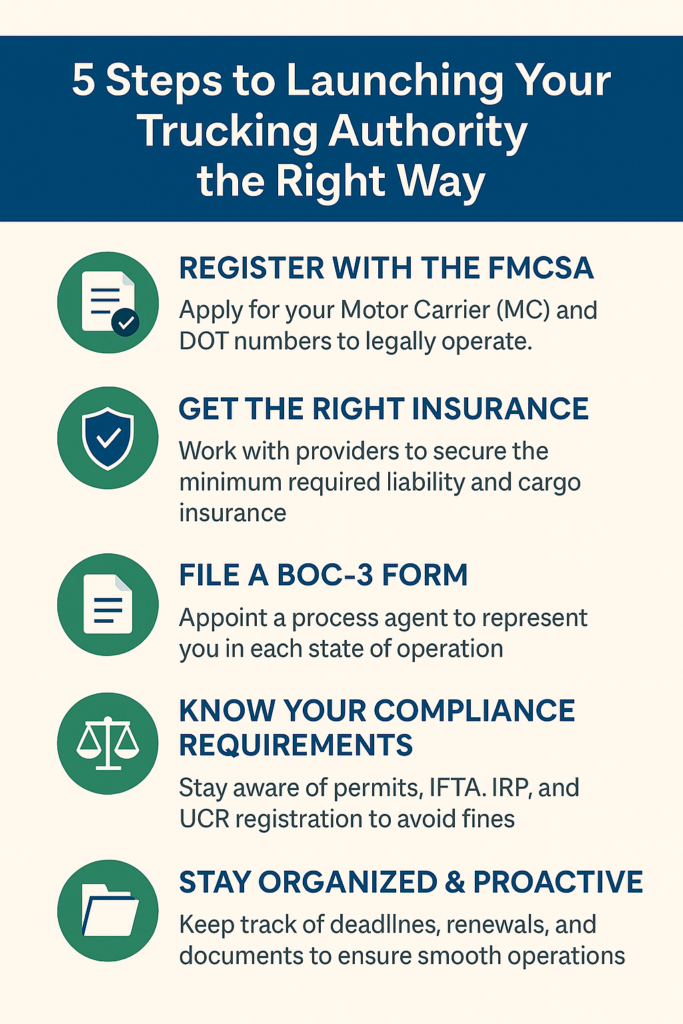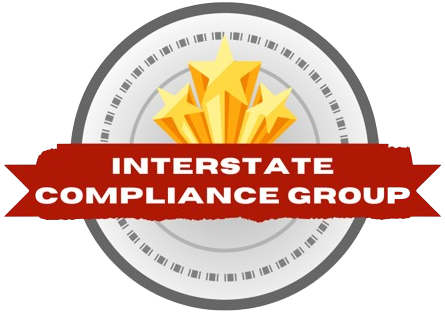Starting your own trucking business can be an exciting yet challenging endeavor. Obtaining a new trucking authority is a crucial step in becoming an independent motor carrier, but the process can feel overwhelming if you’re not familiar with the requirements. From securing the right paperwork to meeting compliance regulations, there are many steps to take before you hit the road.
To help you navigate this process smoothly, we’ve put together five essential tips to ensure you set up your trucking authority successfully. Whether you’re a seasoned driver transitioning to ownership or a newcomer to the industry, following these guidelines will put you on the path to success.
For professional assistance with obtaining your trucking authority, check out the New Authority service.
1. Register Your Business and Obtain an MC Number
The first step in setting up your trucking authority is legally establishing your business. This involves:
Choose a Business Structure
Your trucking business can operate under different structures, such as:
- Sole Proprietorship – Simple but offers no personal liability protection.
- Limited Liability Company (LLC) – Provides liability protection and tax flexibility.
- Corporation (S-Corp or C-Corp) – Best for larger operations but involves more paperwork.
Most trucking entrepreneurs opt for an LLC due to its simplicity and liability protection. Once you’ve decided, register your business with the Secretary of State in your home state.
Apply for a USDOT and MC Number
To operate legally, you’ll need to apply for a United States Department of Transportation (USDOT) number and a Motor Carrier (MC) number through the Federal Motor Carrier Safety Administration (FMCSA). These numbers are essential for tracking safety records and regulatory compliance.
Understand Operating Authority Requirements
Your MC number determines the type of authority you need, such as:
- Freight Carrier Authority – Required for transporting goods.
- Broker Authority – Needed if you plan to arrange freight transportation without owning a truck.
- Household Goods Authority – Necessary for moving household items.
Each authority type comes with specific regulations, so ensure you apply for the one that matches your business model.
2. Secure Proper Insurance Coverage
Insurance is one of the most critical steps in setting up your trucking authority. Without proper coverage, you won’t be able to activate your MC number.
Minimum Insurance Requirements
The FMCSA requires carriers to maintain a minimum of $750,000 in liability insurance, but most brokers and shippers require at least $1 million. Other insurance requirements include:
- Cargo Insurance – Covers the goods you transport.
- Physical Damage Insurance – Protects your truck in case of an accident.
- General Liability Insurance – Provides coverage for accidents occurring outside the truck.
Find a Reliable Insurance Provider
It’s essential to work with an insurance provider experienced in the trucking industry. Compare multiple quotes to find the best rate while ensuring your policy meets FMCSA compliance.
Once you obtain insurance, your provider will file Form BMC-91 or BMC-91X with the FMCSA to validate your coverage.
3. Register for IRP, IFTA, and Other Compliance Programs
Trucking companies operating across state lines must comply with various fuel tax and registration programs. Neglecting these registrations can result in hefty fines.
International Registration Plan (IRP)
The IRP allows you to operate in multiple states with a single registration. You’ll need to register your vehicle under IRP and pay fees based on the miles you travel in each state.
International Fuel Tax Agreement (IFTA)
Under IFTA, trucking businesses must report and pay fuel taxes quarterly based on miles driven and fuel purchased. This agreement simplifies tax reporting across jurisdictions and ensures you remain compliant.
BOC-3 Filing
A BOC-3 form (Designation of Process Agent) is required before activating your MC authority. This form designates an agent in every state where you operate who can receive legal documents on your behalf.
UCR Registration
The Unified Carrier Registration (UCR) program applies to all interstate trucking companies. You must pay an annual fee based on the number of vehicles in your fleet.
4. Develop a Strong Compliance and Safety Plan
Safety and compliance are essential for running a successful trucking business. Without a solid compliance strategy, you risk violations that could lead to fines or even a shutdown.
Establish a Driver Qualification File
If you plan to hire drivers, you must maintain a Driver Qualification File (DQF) for each employee. This file should include:
- Driver’s license and medical certificate
- Previous employment records
- Motor Vehicle Record (MVR)
- Drug and alcohol testing results
Implement a Drug & Alcohol Testing Program
FMCSA requires all carriers with a trucking authority to participate in a drug and alcohol testing consortium. Drivers must complete pre-employment testing and be subject to random drug tests.
Stay Compliant with Hours of Service (HOS) Regulations
To prevent fatigue-related accidents, trucking companies must follow Hours of Service (HOS) regulations. Invest in Electronic Logging Devices (ELDs) to track driving hours accurately and remain compliant with FMCSA mandates.
For more details on HOS compliance, check out Hours of Service Regulations.
5. Build Relationships with Shippers and Freight Brokers
Once your trucking authority is active, you need to start securing loads. Building strong relationships with shippers and freight brokers will help you keep your truck moving and generating revenue.
Use Load Boards to Find Freight
Load boards like DAT, Truckstop.com, and Convoy can connect you with shippers and brokers looking for carriers. While these platforms are a great way to start, they often involve low-paying freight, so use them strategically.
Negotiate Contracts and Rates
Developing long-term relationships with direct shippers can provide better rates and consistent work. Be sure to negotiate fair contracts and understand the terms before accepting loads.
Invest in a Transportation Management System (TMS)
A TMS software can help you streamline operations by managing dispatch, invoicing, and compliance records efficiently.

Final Thoughts
Setting up your trucking authority requires careful planning and execution. By registering your business correctly, securing insurance, staying compliant, and building strong relationships, you can position your trucking company for long-term success.
If you need professional guidance, check out the New Authority service to simplify the process and ensure compliance from day one.
Starting a trucking business is a big step, but with the right preparation, you can hit the road confidently and grow your operation into a thriving enterprise!





